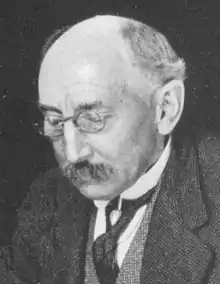William Joseph Rainbow
William Joseph Rainbow (1856–1919) was an entomologist and arachnologist whose work includes the first catalogue of Australian spiders.[1][2]

Life
Rainbow was born in 1856 in Yorkshire, England. His father was a Warrant Officer in the Royal Marines, so his education was in a number of port towns and in Edinburgh. He emigrated to New Zealand in 1873, where he wrote for John Ballance's Wanganui Herald. Rainbow's early interest in natural history was assisted by Ballance, who prompted him to build a career in the field.[3]
In 1883 he moved to Sydney, Australia and married Arriette Dainty. He continued to contribute to newspapers and journals, including The Sydney Morning Herald, Daily Telegraph, and Evening News, then worked for the Government Printing Office until 1895; in this year he took up a position at the Australian Museum as an entomologist.[4]
Rainbow was a founder of the Naturalists' Society of New South Wales, serving as its president.[5] He was a member of the Linnean Society of New South Wales and Council of the Royal Zoological Society of New South Wales. He was made a fellow of the Entomological Society of London and Linnean Society of London, and a member of the Société Entomologique de France.[3]
He died in Sydney on 21 November 1919,[4] having suffered several years of tragic losses. His second son, Sergeant Oscar A. Rainbow, was killed in World War I, an event that seems to precipitated the death of Arriette in 1917. His eldest son was William A. Rainbow, a librarian at the Australian Museum. Rainbow's death was a few days before his youngest, Eric, also a Sergeant, returned from active service.[3]
Works
During the period from 1893 until his death, he described around 200 species of spiders, and wrote 71 papers, around 50 of these on the subject of arachnology. His catalogue of Australian orb-weaver spiders, A Census of Australian Araneidae, listing 1102 species, was produced in 1911; it is noted as a significant advancement in the much ignored spiders of Australia.[2] His works included papers on the spiders found in all the Australian states and the Pacific region. He also wrote two guide books, A guide to the study of Australian butterflies (T.C. Lothian, Melbourne, 1907) and Mosquitoes; their Habits and Distribution.[4]
He left an incomplete manuscript, "Spiders from Molangul, S.E. Queensland" that was accompanied by his sketches.[3]
His collection of specimens is maintained by the Australian Museum;[6] this includes a collection of Australian Acari, mites and ticks, whose study was begun by Rainbow.[7][8]
The species Trittame rainbowi commemorates this author's contribution to the field of Australian arachnids.[9] The author citation Rainbow refers to this entomologist and arachnologist when citing a biological classification.
References
- Rainbow, W.J. 1911. A census of Australian Araneidae. Records of the Australian Museum 9: 107-319
- Davies, Valerie Todd; et al. (30 Mar 2006). "Order Araneae: Spiders". Australian Faunal Directory. Government of Australia. Retrieved 2009-03-06.
- Musgrave, Anthony (1920). "Obituary William Joseph Rainbow" (PDF). Records of the Australian Museum. Australian Museum. 13 (3): 87–92. doi:10.3853/j.0067-1975.13.1920.858. ISSN 0067-1975.
- Kury, Adriano B. "William Joseph Rainbow". Omnipaper. Museu Nacional (Brazil). Retrieved 2009-03-06.
- McCarthy, G.J. (26 February 2007). "Rainbow, William Joseph (1856 - 1919)". Bright Sparcs. University of Melbourne. Retrieved 2009-03-06.
- "The arachnology and myriapod collections". Spiders. Australian Museum online. 2002. Retrieved 2009-03-07.
- Rainbow W.J. 1906. A synopsis of Australian Acarina. Records of the Australian Museum 6, 145-193.
- Halliday, Bruce (April 2007). "Mites - Order Acari". Australasian Arachnology 77. Australasian Arachnological Society. Retrieved 2009-03-07.
- Raven, Robert; Marshall, Tracey. "A spider honours list?". Staff publications. University of Queensland. Retrieved 2009-03-06.
External links
- Rainbow bibliography in Musgrave, 1920, Rec. Aust. Mus. 13(3): 87–92
 Data related to William Joseph Rainbow at Wikispecies
Data related to William Joseph Rainbow at Wikispecies